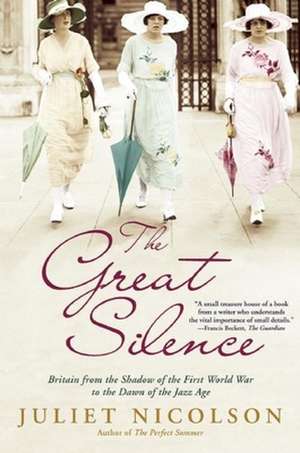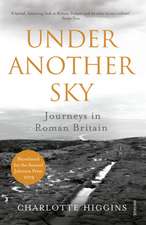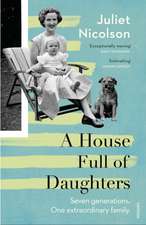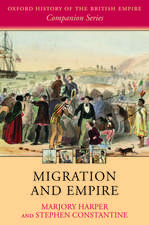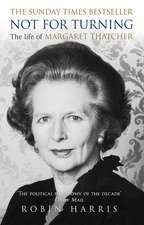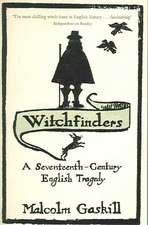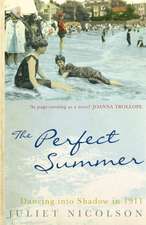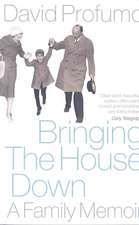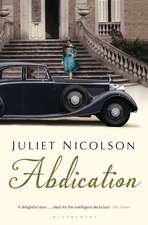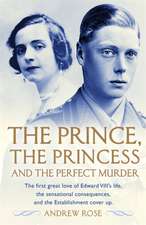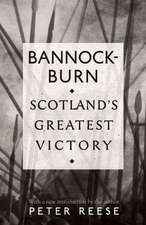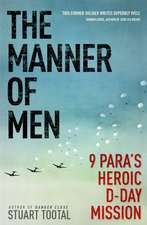The Great Silence: Britain from the Shadow of the First World War to the Dawn of the Jazz Age
Autor Juliet Nicolsonen Limba Engleză Paperback – 31 mai 2011
Preț: 69.91 lei
Nou
Puncte Express: 105
Preț estimativ în valută:
13.38€ • 13.92$ • 11.05£
13.38€ • 13.92$ • 11.05£
Carte indisponibilă temporar
Doresc să fiu notificat când acest titlu va fi disponibil:
Se trimite...
Preluare comenzi: 021 569.72.76
Specificații
ISBN-13: 9780802145406
ISBN-10: 080214540X
Pagini: 302
Ilustrații: B&W photos
Dimensiuni: 137 x 208 x 23 mm
Greutate: 0.32 kg
Editura: Grove Atlantic
ISBN-10: 080214540X
Pagini: 302
Ilustrații: B&W photos
Dimensiuni: 137 x 208 x 23 mm
Greutate: 0.32 kg
Editura: Grove Atlantic
Recenzii
“Wonderful. . .[Nicolson] describes brilliantly, in a series of social anecdotes and snapshots of real people—35 characters going about their daily life, the low-stairs people as well as royalty as well as famous writers and artists. . . an absolutely gripping piece.”—Tina Brown, NPR.org
“[Nicolson’s] approach is anecdotal and eclectic, drawing freely on contemporary diaries, letters and memoirs to create an impressionistic picture of the lull preceding the Roaring ‘20s…Nicolson is at her most effective when describing the nation’s search for a fitting public expression of its abiding sense of grief…[she] observes with poignant understatement.”—Elizabeth Lowry, The Wall Street Journal
“Nicolson’s emphasis on…three days, and her descriptions of them, are the best parts of her book.”—Martin Rubin, The Washington Times
“[Nicolson has] a strong narrative, an empathic interest in characters under stress and a gift for the telling moment. The large historical shifts are here, but the small scenes steal the show…eloquent.”—Catherine Holmes, The Post and Courier (Charleston)
“Wonderfully vivid…When we study history we…tend to overlook the transitional periods. Juliet Nicolson has, in a short time, become the voice of these critical gaps in the fabric of British history…In another splendid work of social history, Nicolson focuses on the years between 1918 and 1920. At once grand and intimate, Nicolson takes on a captivating journey.”—The Daily Beast
“[A] vivid account of the aftermath of the carnage we glamorize as the Great War…[Nicolson] excels at ferreting out revealing details…[she offers] some wonderful vignettes. And the final pages of The Great Silence, which document Britain’s official tribute to the dead, are magnificent.”—Miranda Seymour, The New York Times Book Review
“Fascinating…Writing in a pellucid style with a keen eye for detail, Nicolson captures politics, society and culture and organizes and blends them into an insightful, entertaining narrative.”—Roger K. Miller, Louisville Courier-Journal
“Nicolson’s anecdotal history describes with facts and feeling the two years of silence and emptiness that followed the joyless armistice...a moving account…When the unknown British soldier was buried with solemn pomp in Westminster Abbey, some found the ritual stagy, sentimental, and hypocritical but most found it healing and hopeful. Nicolson ends her history with a long and loving re-creation of this collective expression of grief and gratitude. It may make you cry.”—Barbara Fisher, The Boston Globe
“Captures an era of unspooling mores in the lives of a diverse cast of provocateurs.”— Vogue
“This is social history at its very best, as Nicolson fascinatingly describes the fast-changing lives of everyday men and women in Britain from 1918 to 1920…Colorful characters abound in Nicolson’s historically insightful and utterly absorbing narrative.”—Chuck Leddy, Minneapolis Star-Tribune
“A pearl of anecdotal history, The Great Silence is a satisfying companion to major studies of World War I and its aftermath…as Nicolson proceeds through the familiar stages of grief—denial, anger and acceptance—she gives you a deeper understanding of not only this brief period, but also how war’s sacrifices don’t end after the fighting stops.”—Ellen Emry Heltzel, Seattle Times
“Vividly [portrays] the horrors of trench warfare and the misery of the bereaved and wounded.”—Publishers Weekly
“Terribly moving…so full of feeling and intelligence and interest: the densely detailed, whelmingly sad story of a country with a broken heart.”—Sam Leith, The Daily Mail (UK)
“If, instead of looking at the great sweep of history, you take just two years, and you find out the small, everyday things that people of all stations in life were doing... you can convey a sense of the past that no conventional history can offer…the method enables [Nicolson] to take us into places that... people...did not know existed…This is a small treasure-house of a book from a writer who understands the vital importance of small details.”—Francis Beckett, The Guardian (UK)
“A beautifully written and thought-provoking read.”—Natasha Harding, The Sun (UK)
“[Nicolson’s] approach is anecdotal and eclectic, drawing freely on contemporary diaries, letters and memoirs to create an impressionistic picture of the lull preceding the Roaring ‘20s…Nicolson is at her most effective when describing the nation’s search for a fitting public expression of its abiding sense of grief…[she] observes with poignant understatement.”—Elizabeth Lowry, The Wall Street Journal
“Nicolson’s emphasis on…three days, and her descriptions of them, are the best parts of her book.”—Martin Rubin, The Washington Times
“[Nicolson has] a strong narrative, an empathic interest in characters under stress and a gift for the telling moment. The large historical shifts are here, but the small scenes steal the show…eloquent.”—Catherine Holmes, The Post and Courier (Charleston)
“Wonderfully vivid…When we study history we…tend to overlook the transitional periods. Juliet Nicolson has, in a short time, become the voice of these critical gaps in the fabric of British history…In another splendid work of social history, Nicolson focuses on the years between 1918 and 1920. At once grand and intimate, Nicolson takes on a captivating journey.”—The Daily Beast
“[A] vivid account of the aftermath of the carnage we glamorize as the Great War…[Nicolson] excels at ferreting out revealing details…[she offers] some wonderful vignettes. And the final pages of The Great Silence, which document Britain’s official tribute to the dead, are magnificent.”—Miranda Seymour, The New York Times Book Review
“Fascinating…Writing in a pellucid style with a keen eye for detail, Nicolson captures politics, society and culture and organizes and blends them into an insightful, entertaining narrative.”—Roger K. Miller, Louisville Courier-Journal
“Nicolson’s anecdotal history describes with facts and feeling the two years of silence and emptiness that followed the joyless armistice...a moving account…When the unknown British soldier was buried with solemn pomp in Westminster Abbey, some found the ritual stagy, sentimental, and hypocritical but most found it healing and hopeful. Nicolson ends her history with a long and loving re-creation of this collective expression of grief and gratitude. It may make you cry.”—Barbara Fisher, The Boston Globe
“Captures an era of unspooling mores in the lives of a diverse cast of provocateurs.”— Vogue
“This is social history at its very best, as Nicolson fascinatingly describes the fast-changing lives of everyday men and women in Britain from 1918 to 1920…Colorful characters abound in Nicolson’s historically insightful and utterly absorbing narrative.”—Chuck Leddy, Minneapolis Star-Tribune
“A pearl of anecdotal history, The Great Silence is a satisfying companion to major studies of World War I and its aftermath…as Nicolson proceeds through the familiar stages of grief—denial, anger and acceptance—she gives you a deeper understanding of not only this brief period, but also how war’s sacrifices don’t end after the fighting stops.”—Ellen Emry Heltzel, Seattle Times
“Vividly [portrays] the horrors of trench warfare and the misery of the bereaved and wounded.”—Publishers Weekly
“Terribly moving…so full of feeling and intelligence and interest: the densely detailed, whelmingly sad story of a country with a broken heart.”—Sam Leith, The Daily Mail (UK)
“If, instead of looking at the great sweep of history, you take just two years, and you find out the small, everyday things that people of all stations in life were doing... you can convey a sense of the past that no conventional history can offer…the method enables [Nicolson] to take us into places that... people...did not know existed…This is a small treasure-house of a book from a writer who understands the vital importance of small details.”—Francis Beckett, The Guardian (UK)
“A beautifully written and thought-provoking read.”—Natasha Harding, The Sun (UK)
Notă biografică
Juliet Nicolson is the granddaughter of Vita Sackville-West and Harold Nicolson, and the daughter of Nigel Nicolson. She lives in London and Sissinghurst, Kent. She is the author of the bestseller The Perfect Summer: England 1911, Just Before the Storm.
Descriere
Armistice Day 1918 dawns with great joy for victorious Britain, but the nation must confront the carnage war has left in its wake. In "The Great Silence," Nicolson looks through the prism of daily life to narrate the rich but unknown history of the slow healing Britain undergoes in the two years following that day.
